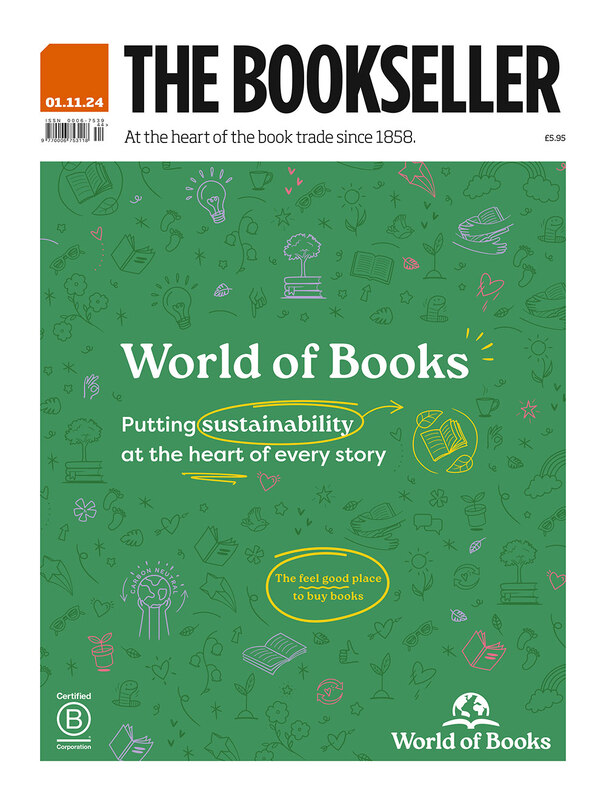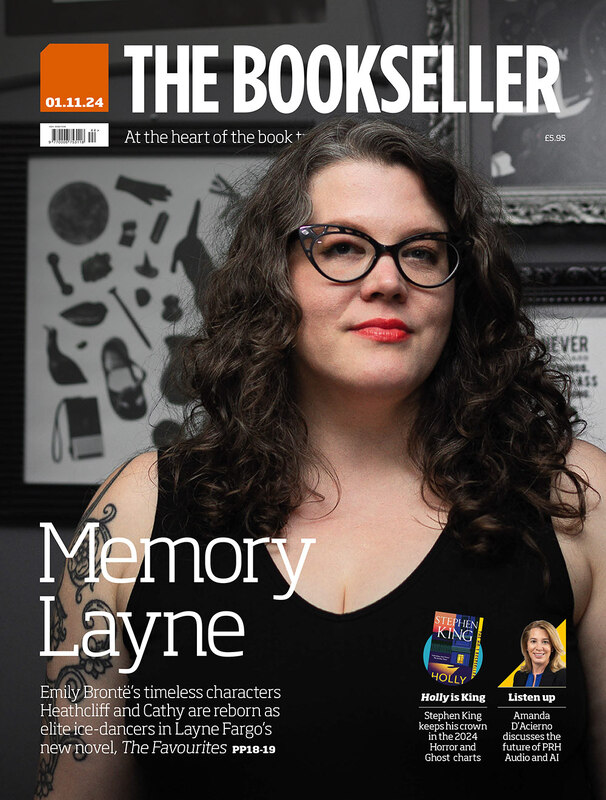You are viewing your 1 free article this month. Login to read more articles.
What next for Borders?
Of all the significant book chains trading in Britain today, Borders has had the most turbulent recent history. It arrived here as an offshoot of the American chain in 1997, but has since changed hands twice in two years after the Americans retreated to shore up their domestic market. 2009 has been a particularly eventful year for Borders UK, with jobs lost and five stores shut—one of them the Oxford Street flagship that was the first store to open in 1997—and a management buy-out for good measure.
Borders' first employee in the UK in 1997 was a 37-year-old Philip Downer, and today he is both chief executive and part-owner of the business. So he is Employee Number One in both senses, although, were it not for a fitted kitchen, he might have left the chain completely. More of that later. He is also, perhaps because of the unseasonably fine weather, in a pretty optimistic mood all things considered.
For one thing, he is happy to paint a portrait of a Borders store in five years time—whereas some have questioned whether the chain will last the next five months. With the web and supermarkets squeezing the chains and a recession biting, is there room for two specialist national book chains? Mind you, Waterstone's has well-documented problems of its own.
"Borders is going to evolve more in terms of being a merchandising space [over the next 5 years], with a more clearly delineated and bigger children's offer, for instance, and different, additional merchandising supporting books and the other products. I can also guarantee that a significant portion of our income will come from something we haven't yet identified."
Downer has "an interest" in the m.b.o., although he won't go into figures, but why take the risk in such a difficult market? "I genuinely believe we have got a unique retail proposition—and I'm carefully saying retail rather than saying unique chain of bookshops. We have a proven track record when it comes to attracting large numbers of customers, families, an ability to reach out into and become a part of the community—and that indicates to me that there are other sales opportunities for us."
And does that mean maintaining Borders' historic split in-store weighting between two-thirds book and one-third non-book?
"If I'm looking further forward then I think it would be careless, in a world of digital disintermediation, to be saying ‘yes, we will always sell this volume of physical books'. If I'm certain of one thing it's that delivering the perfect old Borders model is not going to be the salvation of this business."
So what will the "new" Borders look like? "The new Borders is going to have a greater variety of other product in it," predicts Downer. "Books, clearly, absolutely still at the core—but there's no point in doing three metres of road atlases when people don't buy many road atlases any more. That's not about e-readers or anything—that product has gone because another technology has taken its place. You could put more fiction in there, but bear in mind we already have very nicely spaced stores, we don't need more stock." The reference to holding too much stock is a reaction to the more cumbersome model used for the first decade of Borders' life, which Downer has spent much of the last two years trying to unpick.
When the business was first set up here US systems were brought over. Borders had a state-of-the-art (for the mid-90s) IT and merchandising system, but it depended on a high level of buyer input. "Every time you ordered a book the buyers had to hit a key," Downer recalls, "it was not automatic replenishment. So as you grew the business you had to keep hiring more buyers—there were no economies of scale."
On the distribution side, Borders revolved around a central hub, (located, oddly, in Cornwall), with books shooting up and down the M5. "Ordering stock from HarperCollins, putting it on a lorry and sending it to Cornwall, letting it rest in Cornwall for a few days, putting it back on a lorry and sending it back to our store in Glasgow. Utter insanity." The US model depended on cheaper fuel, on longer lead times before publication date, and on bigger, cheaper stores that could sit on more stock if necessary.
When the US parent sold the business to Luke Johnson's Risk Capital Partners in autumn 2007 for £10m, Borders UK had exactly a year to set up a new IT and merchandising system before the licence ran out, a deadline met with a few days in hand.
"One of the big benefits of moving over to our new system suite is that we are able to manage the business on a far lower stock holding—partly because it doesn't have to go down to Cornwall, be processed and come back again, which takes a week, and partly because the Borders system was based on cycle replenishment, which meant that many publishers were only looked at once a month, or once every six weeks—so you'd have a relatively significant publisher, like McGraw Hill, and we'd only place a backlist order once a month—which in turn means you have to carry three copies of every title to ensure availability. Now we can place a McGraw Hill order every morning, with direct delivery from the publisher/distributor to the store." Stores are graded by categories and genre, and much of the replenishment is automated.
For the best part of a decade Borders attempted to replicate what worked successfully in the US in the UK, without, perhaps, taking enough account of the smaller size of the market, and problems started to escalate as the market tightened. "The challenge was that the US model was based on the assumption that we would continue to expand and thus leverage the cost of running the business, rather than that we needed to take a fundamental look at the cost base and some of the systems that were supporting the business.
"It meant that the assumption, on the Americans' planners part, was that we would become progressively more and more profitable. Unfortunately there was too much inflexible cost in the US model so the costs just carried on increasing."
Observers have always looked at the comparatively large size of the Borders' stores and wondered if they can ever be profitable; in America, because of cheaper land and fewer planning restrictions, retail space is roughly half the price that it is here, allowing giant stores to flourish.
Ironically, before Downer joined Borders he was in the US opening small-format stores for Waterstone's, which itself was then part of W H Smith. His job in Britain, as operations director, was to find sites for new Borders. The US stores average 40,000 sq ft and the initial view was to replicate that in British city centres; achieved at Oxford Street, Glasgow Buchanan Street and the Briggate Leeds.
But suitable sites became hard to find, so the focus shifted to edge-of-town. The Cheshire Oaks store was the first of these; a new style retail park designed to attract the entire family with food, fashion and electricals, much more than just a collection of warehouses on a windy industrial estate.
Borders came into the UK by buying Books Etc, which was run separately from Borders. He denies it was starved to let Borders flourish (although he concedes that "Borders was the cuckoo in the nest"), saying, "on the contrary, it was indulged, and then things were whipped away from it." He recalls a failed experiment to open lifestyle bookshops in secondary locations beyond the capital. Today nine remain, with an average size of 5,000 sq ft, as opposed to the average 20,000 sq ft of the 36 Borders superstores (which have been shrunk progressively since the late '90s).
Indeed, since 1997 Books Etc has slipped steadily down the agenda, and now the future of the entire fascia is highly uncertain. Is it withering on the vine?
"I hate to use the term withering on the vine—but it's not a business we're investing in." You clearly envisage exiting that business entirely at some point? "Yes, and we've been very open with the management team in those stores."
Why, are they just not profitable, is it just not your bag? "The world has moved on, so locations that were ideal 15 years ago are no longer ideal. We have a big store in Whiteleys; not a lot happens in Whiteleys these days, since Westfield opened [Both are shopping centres in West London]."
OK, that applies to that one store, but couldn't small, central, urban specialist book stores still work in the right place?
"Potentially they could, yes, but my focus is on what I can do with 36 superstores, how I can grow the revenue that we get from those superstores, and how I can grow the number of superstores; I do want to open more stores. The nature of Books Etc is that the Etc doesn't amount to a great deal; a peripheral offer of cards and a bit of stationery. They are essentially bookstores; the ability to flex and enhance the range, that we are pursuing in Borders, would be much more difficult in a Books Etc store." Subsequently, Downer has confirmed that the Books Etc stores had been moved into a "clearance format", although he would not be drawn on a precise closure date for the fascia.
A question of timing
To rewind slightly to the main Borders story, by 2007 all these combined factors led to the Americans selling the business to Risk Capital Partners. David Roche was installed as top dog, with Downer dropping back from m.d. to retail director, although many speculated Downer would leave at that point. "I speculated I would leave at that point," he laughs. So why stay? "One, Borders and David Roche were keen for me to stick around; two, nothing immediately presented itself; three, I was committed to a massive construction project at home. [The aforementioned kitchen]. I was having the whole back of the house blown out and propped up with tens of thousands of pounds of steel—it didn't feel like an opportune time to just jump and see what happens." Roche exited the business surprisingly quickly—for reasons even now Downer won't discuss.
Nor, indeed, will Luke Johnson, although he is full of praise for Downer, describing him as a hard-working, dedicated retailer who knows the business inside out who did a pretty good job while they worked together. Johnson openly acknowledges that Borders, like all retailers, is facing a difficult period, with the economy under pressure and discretionary spend squeezed. "To be honest, there is isn't a great deal of immediate relief in sight. Philip and his team are doing the best job that can be done in the circumstances and I'm hopeful that they can make it a success—and I'm sad that I couldn't make it a success."
Last Christmas was the first test of the new merchandising, IT and distribution set-up, which, combined with the banking collapse and decline in consumer confidence, led to a perfect storm Downer hopes was a one-off. He describes it as a "challenging" Christmas. Could I take that as code for sales down, losses up, footfall down? "You could probably take it as code for something like that," he agrees.
Even though this Christmas should be less cataclysmic than last, many consumers are still watching every penny, and, partially in response, books are being heavily discounted. Downer describes books as "a commodity product in a sense—this is where you get blackballed by the Society of Bookmen—in that the product is identical wherever I buy it from. So if I'm looking for a novel it doesn't matter if I buy it from Hatchards or Asda—the product once I've peeled the sticker off is identical. And if Asda is charging less than Hatchards, then Hatchards clearly has got to be offering something more, which Hatchards obviously does" i.e. in terms of location, status, service, an X-factor, "and that's what we [Borders] have to do because clearly we can't price at supermarket levels." But why not? "Because the margins would be too thin." But if your cost base is higher than a supermarket—doesn't that in the end doom you to extinction? "Assuming that all the world ever wants is 600 book titles."
So is range the answer? "Range is extremely important, informed intelligent service is important, [as is] the ability to locate books for customers that are other than the 50,000 we have on the shelf, and the creation of an environment where people want to spend time, and browse, and meet their friends."
It's been reported that some publishers are unable to obtain credit insurance for their exposure to Borders? "Everybody in this business environment has a level of risk to manage, and in the good times a couple of years ago we, all of us in business, probably accepted too high a level of risk, and it's quite possible that in some instances right now we've battened the hatches down too far and we're accepting too low a level of risk—but I absolutely appreciate where any supplier might be coming from. My job is to demonstrate to our suppliers—with whom we have a lot of very open meetings, where we share our numbers—our cashflow expectations. I have to give them the confidence to do the business with us that we all need to do, and the recognition that our stores can deliver something that others can't."










